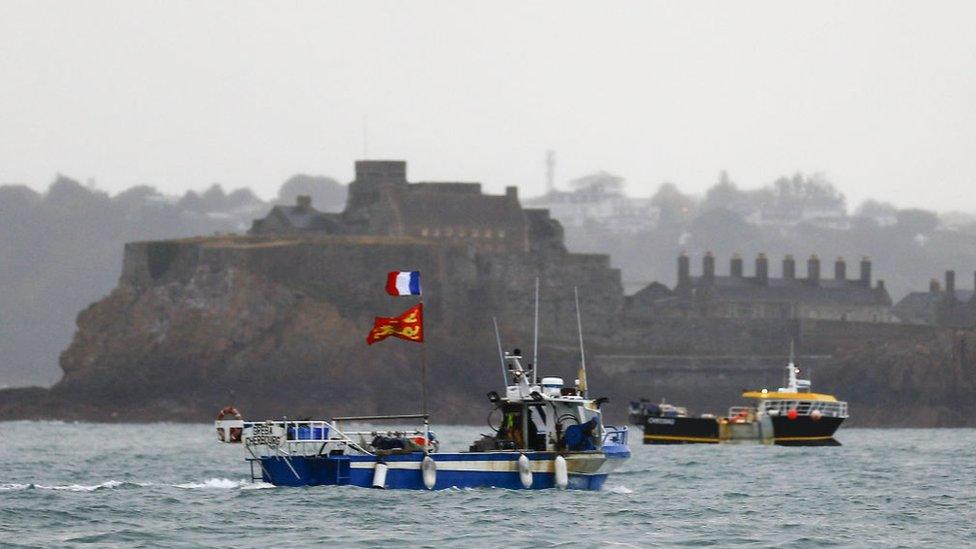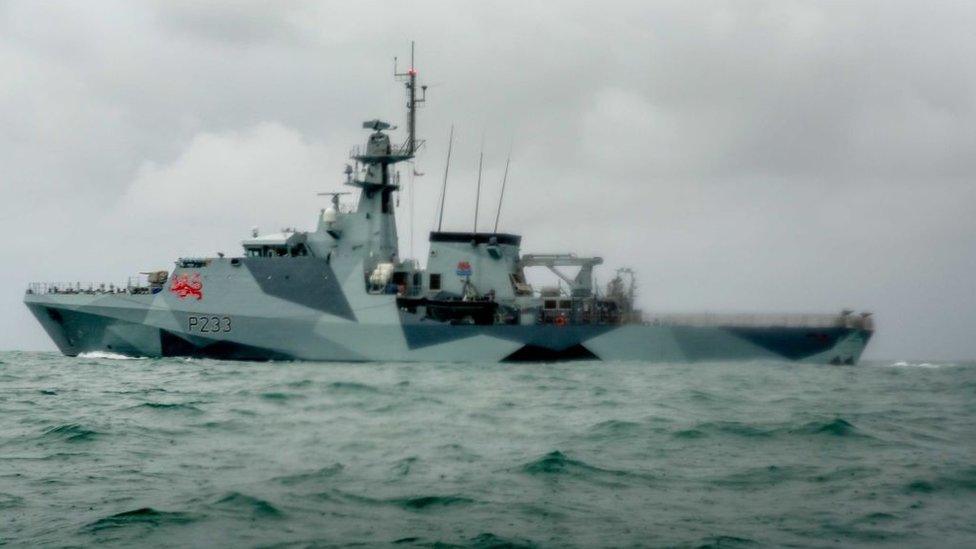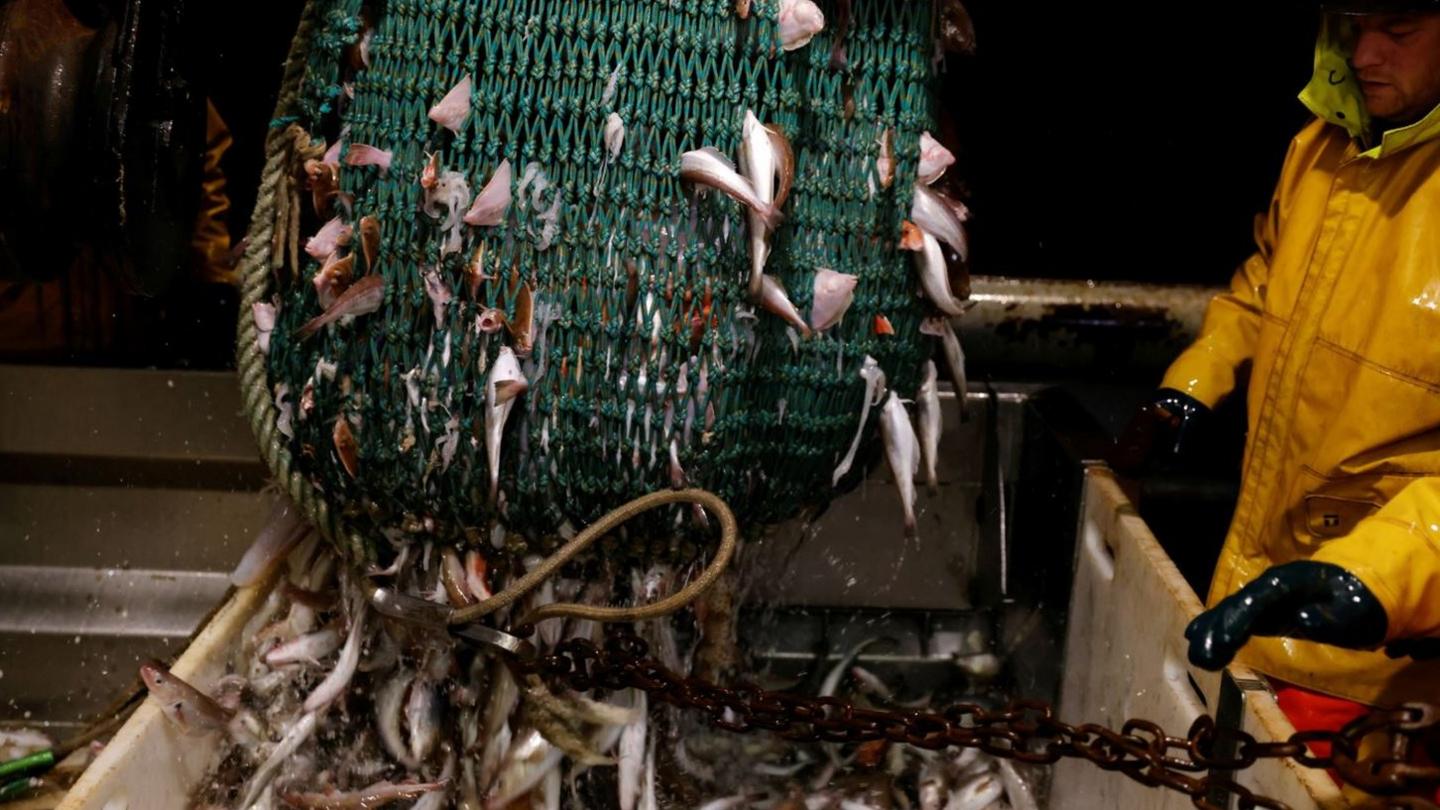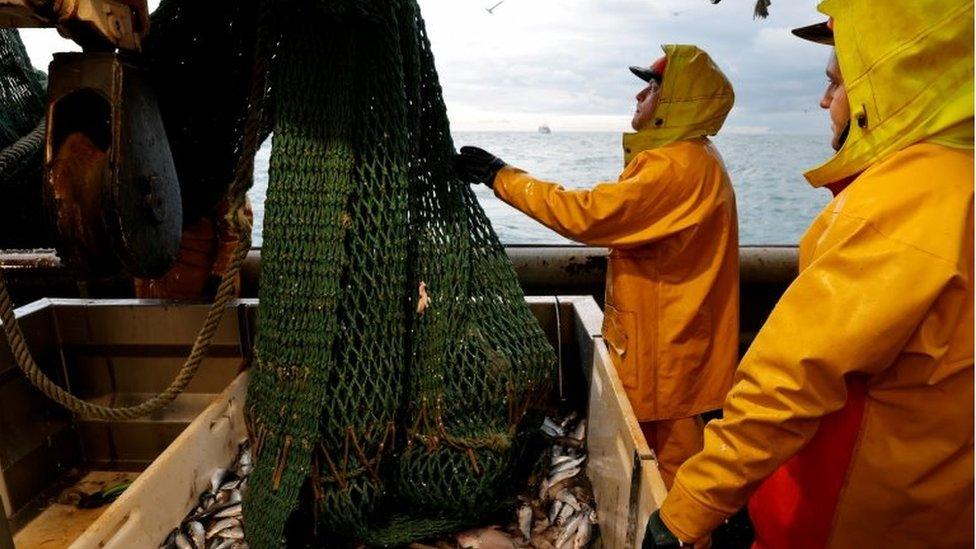UK ships prepare to leave Jersey after dispute over fishing rights
- Published

Two Royal Navy ships are preparing to return home after a protest by French fishermen over post-Brexit rights in Jersey's territorial waters ended.
The UK government said "the situation is resolved for now" but "we remain on standby" to assist Jersey.
French fishermen say their rights are unfairly restricted by licences issued under the Channel Island's new system.
Jersey's External Relations Minister Ian Gorst said discussions with the French crews had been "positive".
The UK said it had agreed with Jersey's government that one of the Royal Navy offshore patrol vessels will return to its home port on Thursday night while the other will leave on Friday morning.
Prime Minister Boris Johnson said he was "pleased the situation in Jersey has been resolved."
"The UK will always stand resolutely by the people of Jersey," he said.
About 60 boats took part in a protest at St Helier, Jersey's capital and main port, prompting the dispatch of two Royal Navy ships - HMS Severn and HMS Tamar - and two French vessels to the area.
The French government said it was acting "in a spirit of responsibility" after the "British failure" to abide by the trade deal.
It said it hoped the situation would be "swiftly resolved by the full and total implementation" of the deal, which France said allowed continued access to British waters for fishermen who worked in them prior to Brexit.
"We want to use all the leverage at our disposal to protect the fishing industry and enable it to continue its activities," a spokesman for France's ministry for Europe and foreign affairs said.

A plan to get noticed
By Jean Mackenzie, BBC Europe correspondent, in Carteret port on the Normandy coast
As the boats pulled out of this harbour at 02:30 on Thursday morning, the fishermen were prepared for this 15-hour stand-off in the cold and rain.
This protest was their plan to get noticed and it worked.
Yes they are angry, but they are also shaken by these unexpected restrictions and worried about their livelihoods. Some fishermen have only been given permission to fish for a handful of days a year.
One fisherman, who catches half his whelks and lobsters along Jersey's shores, told me if he can't get full access to Jersey's waters he will have to sell his boat and change his job.
When they returned to the French coast this evening, drenched and exhausted, they were surprisingly upbeat. Talks with Jersey's government did not go well, they said, but they know they have been heard.
They are now hopeful their government and Brussels will step in to resolve the issue.
They feel their part is done, for now.

A spokesman for fishermen from France's Normandy region suggested the situation was still in "deadlock". Hugo Lehuby told Reuters news agency: "Either this gets resolved, or retaliatory measures are taken."
And a European Commission spokeswoman said "additional conditions" attached to the new fishing licences were a breach of the Brexit trade deal.
France has threatened to cut off electricity to Jersey, the largest Channel Island and a Crown dependency, located 14 miles (22km) off France. Crown dependencies are not part of the UK, but are defended and represented internationally by the British government.

The boats were protesting against new fishing rules - introduced last week by the Jersey government under the UK-EU Trade and Co-operation Agreement (TCA) - which require French boats to show they have a history of fishing in Jersey's waters. But it has been claimed additional requirements were added without notice.
French authorities say "new technical measures" had not been communicated to the EU, rendering them "null and void".
Jersey's Senator Gorst said after Thursday's talks "all sides remain committed" to resolving the concerns that led to the fisherman's protest.

HMS Tamar is one of two Royal Navy ships sent to Jersey
The Royal Navy ships sent to Jersey, HMS Severn and HMS Tamar, are based in Portsmouth and are routinely used for fisheries protection - with sailors able to board other boats for spot checks.
They are both 90.5m in length, have two large guns, including a short-range anti-aircraft weapon, and are crewed by 45 sailors and up to 50 Royal Marines.
France said its two vessels were not on military missions and were told to stay in French waters and to be near the French fishermen to ensure safety.

"I READ MUSIC SCORES AS IF THEY WERE SUBTITLES": What it's like to be a deaf musician
FRESH STARTS: Stacey Dooley chats to people who have embarked on new beginnings

- Published5 May 2021

- Published4 May 2021
